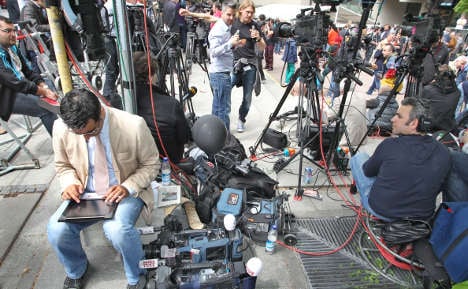Much of this attention was on the trial itself – and on Zschäpe, who as a female “face of evil” seemed even more fascinating than her erstwhile male fellow gang members. But many commentators also pointed to wider problems in Germany that needed to be examined and tackled. Not just institutional incompetence but also widespread racism which is not usually acknowledged.
“Evil has a face,” said the tabloid Bild. “An ordinary face. Beate Zschäpe. The trial is about her guilt and her punishment for ten vile murders. But it is about more! The acts of the brown serial killers tore us from our complacency. We believed in a Germany without swastikas. We believed the state security services had the far right in hand. It had nothing in hand! Here a black man kicked to death, there a migrant shot – we were too comfortable to look more closely.
“The Munich trial will, day for day, open our eyes. The truth hits us in the face. The media, which was such a burden at first for the judges, will make sure that everyone sees how justice is administered in Germany – neutral, incorruptible, and with passion for fairness. The trial will sharpen our consciences.”
A contrasting view was offered by the Frankfurter Allgemeine Zeitung which said that the point of the trial should be explained. “The entire process has an enormous meaning, but this is not to satisfy the expectations of all of those involved – neither German politicians nor the Turkish government. This is also not a trial for the media – and even the victims of the terrible crimes about which things in Munich turn, could easily be disappointed.
“It is the paradox of a trial that the accused often seem to be the victims. But they are in fact not perpetrators – they are being tried by the state’s powers. And their aim is not to convict the accused – this also applies in the NSU trial – rather it is to produce an as objective as possible decision about their guilt.
“The strict formality of the criminal process serves the aim of a fair trial. Therefore Frau Zschäpe does not have to make a statement; therefore her defence lawyers can and must do everything possible within the rules to get the best for her.”
Those involved have various different wishes for the outcome of this trial – not all can be satisfied, the paper said. “But all must recognize – the trial itself is an aim in itself,” it concludes.
The Bavaria-based Augsburg Allgemeine newspaper was less optimistic. “The process of working through the biggest Nazi murder series in the history of the Federal Republic started with legal skirmishes, which must be taken as signals for how it will continue.
“The Munich judges have the job of reconstructing the acts as closely as possible. Human and political failures as well as unfit security services and authorities could be illuminated. Questions of those left behind might be answered. But not necessarily.”
The Berliner Zeitung said the court only had a limited responsibility. “The court must, briefly said, check the contents of the charges. It cannot repair the failures of the state. Those who gee up greater expectations only create frustration among the weakest – the relatives of the dead. But even so, the trial has started. It started in the presence of Turkish journalists and without disturbance from far right radicals. That alone is good news.”
The Münster-based Westfälische Nachrichten warned that people must not get bored as the legal process is followed. “The NSU trial will last for at least until 2014. The public interest will suffer. It is thus all the more important that alongside the careful legal processing, the political consequences also come more into focus. Independently from a possible guilty verdict for Beate Zschäpe – it must not be that the bosses and structures of the security and secret services escape punishment for this incredible investigation disaster.”
The Rhein Zeitung also focussed on the relatives of those killed. “Above all, the trial will hardly be able to salve the personal pain of the relatives. Many of them have lived for years in uncertainty. They still want to know why their father or brother was killed. The atonement for this injustice can hardly be find a suitable expression in whatever kind of harsh punishment may be handed to Zschäpe and her alleged helpers.
“But perhaps the visible efforts and the greatest possible explanation of what happened may convince some that the legal state is not afraid of consequences – and does not recognize second-class citizenship. That it can make mistakes – but that it then tirelessly hunts for the reasons behind them.”
The Local/DPA/hc



 Please whitelist us to continue reading.
Please whitelist us to continue reading.
Member comments